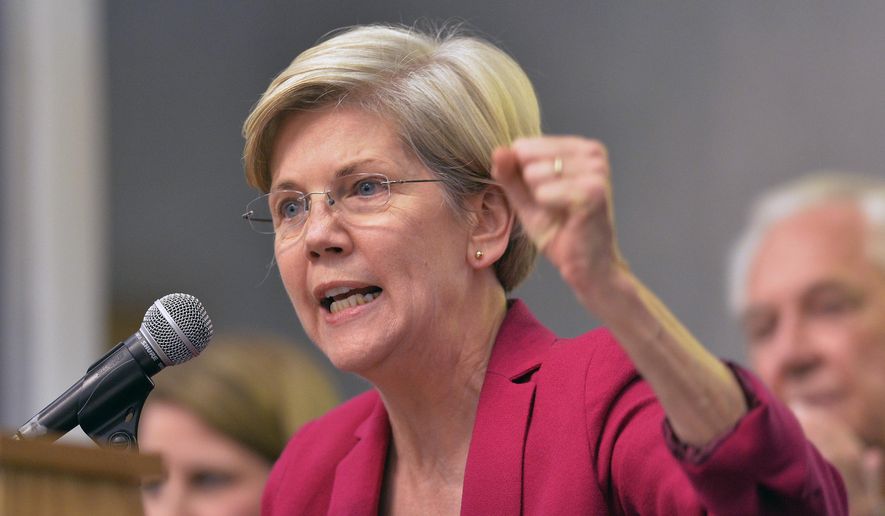OPINION:
Some people think Sen. Elizabeth Warren of Massachusetts could pose a threat to the presidential ambitions of Hillary Rodham Clinton. She could. But she also could pose a threat to the next Republican presidential nominee. Her attacks on America’s big banks could get her more than just media buzz. They could generate lots of votes. Republicans would do well to take her seriously.
It has been a long time since a populist wave washed over the nation and significantly influenced campaign discourse and political events. It happened in the 1820s with the emergence of Andrew Jackson, in the 1890s with the emergence of William Jennings Bryan and in the 1930s with the fiery “share the wealth’’ rhetoric of Huey Long until his 1935 assassination destroyed his movement.
Today, we see economic and political developments that could generate another such populist storm. The key is the plight of the white working class. Andrew Cherlin of Johns Hopkins University tells us that in 1996, the average 30-year-old man with a high school degree earned 20 percent less than a comparable man in 1979.
He outlines the devastation of blue-collar occupations: the percentage of workers classified as precision-production, crafts and repair workers, as well as operatives, fabricators and construction workers, decreased from 28 percent in 1970 to 17 percent in 2010. During the same period, the number of workers operating lathe, milling and turning machines plummeted from 345,000 to 14,000.
In outlining the findings of Mr. Cherlin and other social scientists, New York Times commentator Thomas B. Edsall notes that, unlike blacks and Hispanics, blue-collar whites don’t benefit from affirmative action programs designed to help underrepresented minorities. “If anything,’’ he writes, “these programs serve only to limit their horizons.’’
Meanwhile, writes Mr. Edsall, liberal victories in the sexual and women’s rights revolutions may have eased the lives of many upscale Democrats but have left white working-class women struggling as single parents, forced to cope with male defection and a breakup of family structures that fostered upward mobility in previous generations.
Mr. Edsall has written extensively on how these developments have alienated the white working class from the Democratic Party. A question Democrats might ask, he writes, is: “What has the Democratic Party done for these voters lately?’’ He sees that this is just the kind of civic plight that generates populist anger, and so far that anger has been directed at Democrats. Whites made up 75 percent of the electorate in last month’s elections, notes Mr. Edsall, and voted for Republican House candidates by a 24-point margin.
Some Democrats are starting to pay attention. One is Sen. Charles E. Schumer of New York, who castigated President Obama’s decision to push his Affordable Care Act as his legislative centerpiece, which did not address the concerns of working-class Americans and were seen by many as harming them. “So when Democrats focused on health care,’’ said Mr. Schumer, “the average middle-class person thought, ’The Democrats are not paying enough attention to me.’’’
Mr. Schumer’s comments were widely attacked by Democratic colleagues, but one senator who supported him was Elizabeth Warren. She said through a spokesman that she agreed “there was an urgent need to help middle-class families who were struggling.’’ This puts her into a category of Democrats bent on harnessing the force of any populist sentiment building in the nation.
Her primary targets are the big banks, as she demonstrated on the Senate floor the other day in attacking a provision in the spending bill to soften some regulatory elements of the Dodd-Frank act. Mrs. Warren argued that the provision would increase the likelihood of another bank bailout like the one that followed the economic crisis of 2008-2009. Democrats, Republicans and the American people all dislike Wall Street bailouts, she said. “And yet here we are with Congress on the verge of ramming through a provision that would do nothing for the middle class, do nothing for community banks, do nothing but raise the risk that taxpayers will have to bail out the biggest banks once again.’’
Addressing executives at Citigroup who opposed Dodd-Frank, she said she agreed it wasn’t perfect. “It should have broken you into pieces.’’
At some point, the plight of the American middle class, particularly the working class, will be ameliorated through governmental leadership or will generate a wave of populism the likes of which the country hasn’t seen in many a year. If that happens, Republicans could find themselves in harm’s way if they don’t get themselves right on the banking issue.
That means more than just separating themselves from the big Wall Street banks. It means going after them aggressively and going after the cozy combine among Wall Street, K Street and the government, including the Treasury and the Federal Reserve. The American people increasingly believe that combine is sinister, and they’re right.
Democrats have given Republicans a valuable gift by sticking it to the American working class, once the bedrock of the party’s New Deal coalition. But, if Mr. Schumer and Mrs. Warren have their way, their party will begin taking steps to reverse that situation and bring those working-class Americans back into the fold. If Republicans are flat-footed, the new Democratic populists could create a major fault line between themselves and Republicans on the issue of the big Wall Street banks. That represents the biggest threat to Republicans going into the 2016 elections.
• Robert W. Merry, political editor of The National Interest, is a former president and editor-in-chief of Congressional Quarterly and the author of books on American history and foreign policy.




Please read our comment policy before commenting.